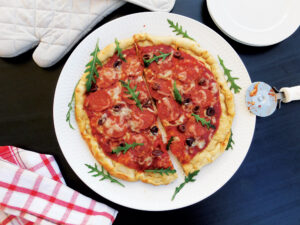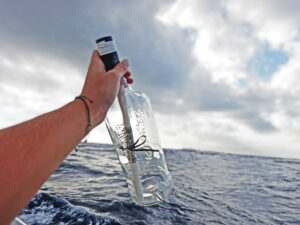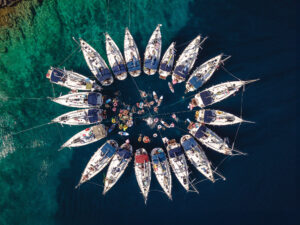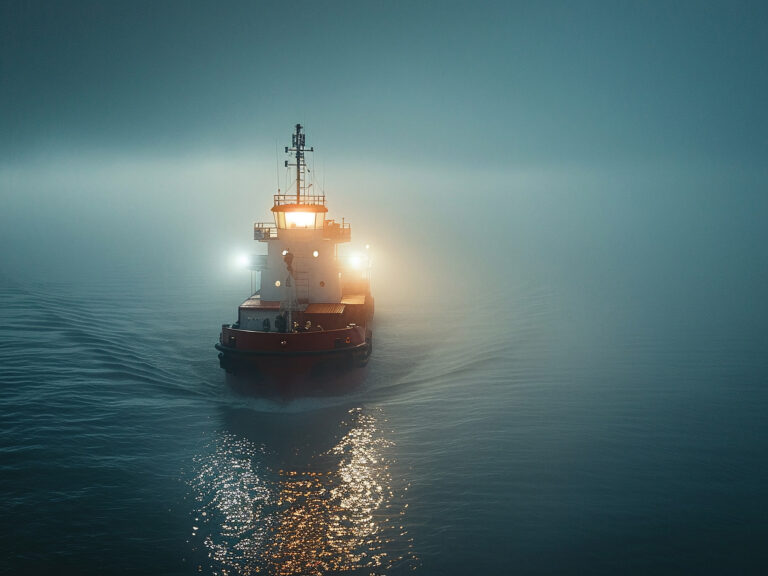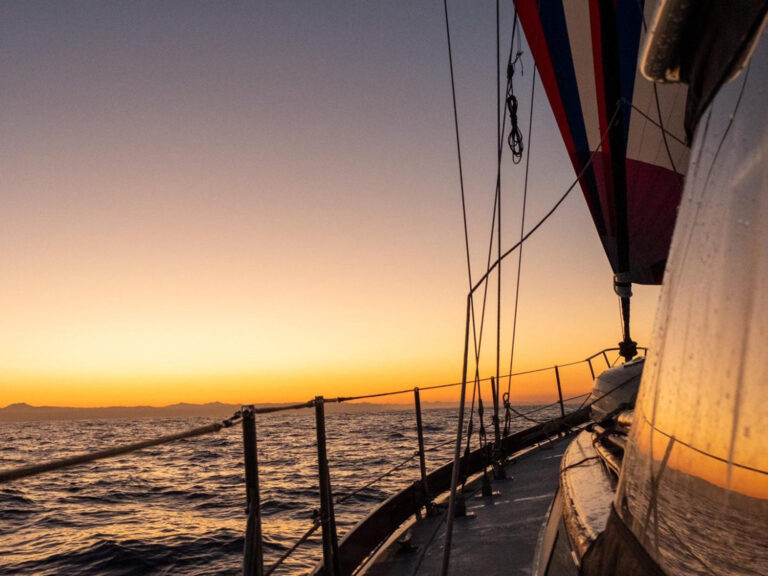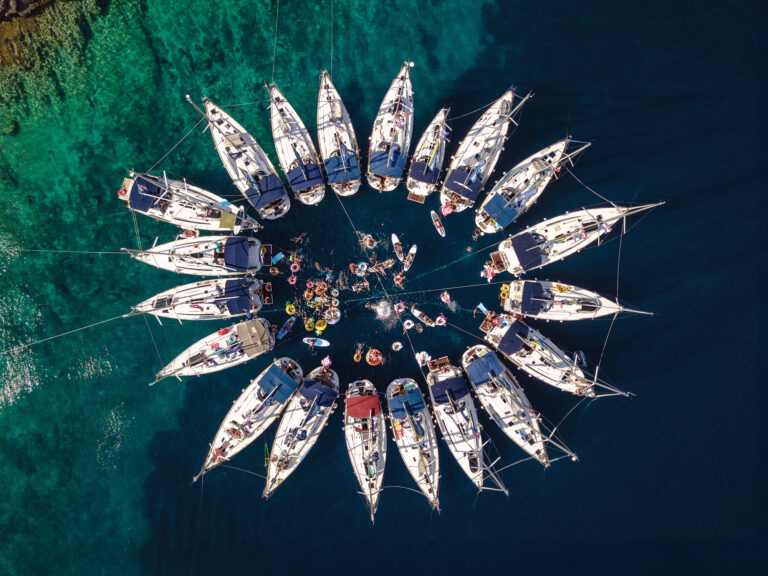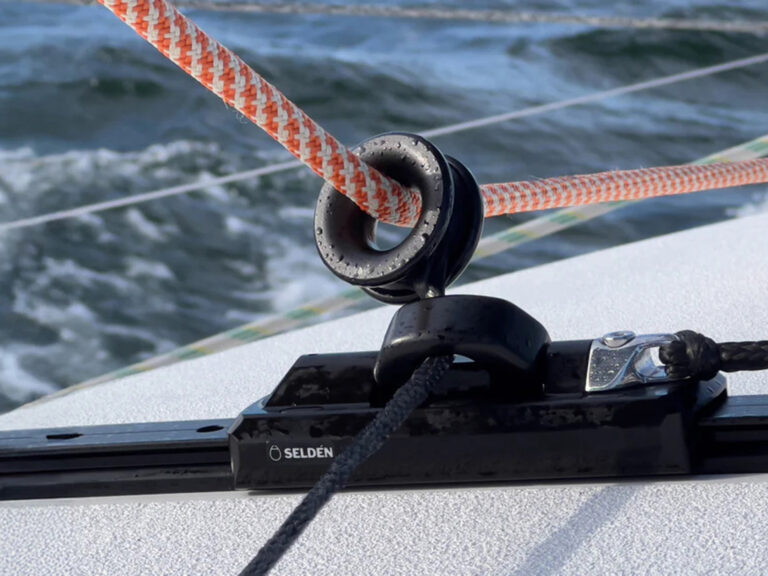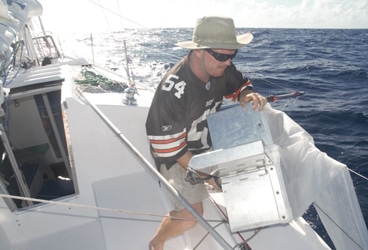
The luxuries of civilization only satisfy those wants which they themselves create. Well, at least that’s what the great scientist and Antarctic explorer Apsley Cherry-Garrard used to say. I can’t say I disagree, yet some luxuries of civilization sound awfully nice right about now. The Harbor 29 is essentially a stripped down version of the Harbor 30 (or a 30 foot version of a Harbor 25 depending on how you want to look at it). It has the same hull, keel, rudder, deck, and rig as the Harbor 30. It’s a lighter boat displacing around 6,500 lbs, the weight loss is not structural there are just less bells and whistles, and no heavy headliner. I think four gung-ho racers doing shifts, two at a time, four on, four off, could do really well in a Newport to Bermuda or Trans-Pac race with this boat. But she provides very few creature comforts.
A bucket on a line is one of our most important multi-purpose pieces of gear on this boat. We actually have two buckets, a clean bucket and a dirty bucket. Our buckets are our dishwasher, our laundry machine, our shower, and if things got really bad, our emergency bilge pump. Making fresh water with a manual water maker is a time consuming process, so we only have fresh water for drinking and re-hydrating our freeze dried food. For everything else its good old sea water in a bucket. I’ve been using buckets in this manner for every major expedition I’ve ever done as a captain or single-handed. That’s around 493 days at sea, counting today (not including boat deliveries). It’s not that I like roughing it, I just haven’t had the money to buy an electric water maker and a boat with enough power to run it. Hopefully I’ll be able to get an electric water maker for Ault, my 42 foot steel schooner one day in the near future. It would certainly be a nice change of pace.
We don’t have refrigeration, nor have I in the past, so once again we are living off of freeze dried food. Its healthy food, at least I’ve never gotten scurvy. It tastes good too, but it always has the same consistency. Every meal is some version of what I call, sailor slop. Since I’ve been living off of freeze dried food as long as I’ve been using buckets for everything, I’m growing a bit tired of it. We don’t have a stove either, just a removable gimbaled single burner that you screw a one pound propane tank into. We did bring 7 pounds of popcorn kernels and some canned ham in an effort to change things up. But it’s still mostly sailor slop for every meal. If this sounds like fun you guys are more than welcome to join me and Nikki on our next trip. Actually I hope to be heading back to the Arctic next year. We have been working out the details on a project with the University of Maine doing glacier research in East Greenland on Ault, but that would require a whole lot more funding than this expedition.
Expeditions don’t come together easily, you have to will them into existence. This Pacific plastics expedition took 10 months of planning and fundraising to put together. We had to write six grants before we were awarded one by the Save our Seas foundation. The Save our Seas foundation really saved this expedition. I still had to donate $3,000 of my own money to fill a gap in our funding, but in the end we pulled it off. Well we haven’t got to Japan yet, but we left the dock which is more than half the battle.
I enjoy the challenge that comes with creating my own business. A non-profit should be treated like a business, we don’t sell a product, we sell our mission. But starting a non-profit is a form of financial suicide. We have been doing this for 2 years without salary, but hopefully that will change soon. Every goal takes hard work and sacrifice. Often the larger the goal the harder you have to work and the more you have to sacrifice. Since we are providing a service at a fraction of the normal cost (inexpensive ocean research) I believe we will be successful. Success feels so much better when you have to work hard to get it.

As I write this we are passing 30 miles north of Wake Island. It is funny to think that when I first starting sailing being 30 miles from land made me feel like I was way out to sea. Now if I’m 30 miles from land I feel like I’m about to run aground. The winds have been fairly steady easterlies for the last five days but I’m afraid that won’t last much longer. I expect light winds, we might even have to motor a bit. After nearly 5,000 miles at sea we have only burned around 3 gallons of diesel, talk about environmentally friendly research! In another 700 miles we will turn north, leave the easterly trades and head for Japan. The Maryland public school system had a lot of snow days this year so our education blog got pushed back. It’s up and running now on the website. Check it out!
We believe that while no one can do everything, everyone can do something. Our project is committed to serving the ocean research community. We provide data that explores man’s relationship with our planet’s oceans. Learn more about the Ocean Research Project at www.oceanresearchproject.org.

